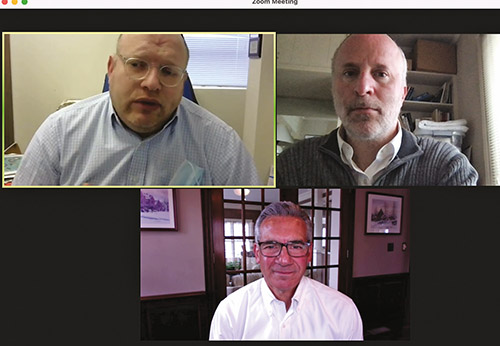


Jack Ciattarelli, Republican candidate for New Jersey governor, began his career in public service as a borough council member and continued as mayor of Raritan Township, a two-term Somerset County freeholder, and a three-term N.J. State assemblyman. The first member of his family to go to college, he attended Seton Hall University, went on to earn an MBA and became a CPA. He eventually established two successful businesses and built a family; he and his wife Melinda have four children.
As Ciattarelli gears up to challenge Democratic governor, Phil Murphy, in the upcoming election, The Jewish Link “sat down” with the candidate via Zoom to discuss some of the important questions of this election season.
JL: Why do you want to be governor?
The state we love is broken in a number of ways. We all know it. I’m determined to fix it. I’m a lifelong resident and a two-time business owner. And I have specific ideas to address what I call the “lifelong struggles” in this state—the struggle for young adults to get established, the struggle to make a good living and meet expenses, the struggles of main street businesses to be profitable, and the struggle to be able to retire here.
JL: Advocates of New Jersey’s many nonpublic schools have had some success in securing state funding to support security measures, STEM education and nursing needs in their schools, though not at the level these imperatives are funded in public schools. Would you advocate increasing the funding for these needs in nonpublic schools in New Jersey? If yes, why, and if not, why not?
Let’s not forget that nonpublic schools are a critical component of our educational system in New Jersey. When students attend nonpublic schools, it decreases the costs in public schools. Parity in funding is something we should give serious attention to. We need to do a better job at it. As one example, I’ll point to security. In 2020, the number of anti-Semitic acts rose to one of the highest levels, so schools serving Jewish students had to increase their security programs. The state government should be a full partner on concerns like this.”
JL: “Different minority groups in the state—Blacks, Jews and Asians, to name a few—report feeling threatened in the current social climate. What actions would your administration take to make them feel safer?
As governor, you must denounce hate at every opportunity and speak about the need to stick together. You must help people appreciate the value of diversity; this is especially important, as New Jersey is the most diverse state in the nation.
In 2020, the number of anti-Semitic acts in New Jersey rose to one of their highest rates, according to figures from the Anti-Defamation League. We certainly have our challenges. Leadership sets the tone. We must call out hate at every opportunity. I believe the governor was wrong when he did not clearly call out anti-Semitism, early on, as the cause for the attacks in Jersey City in late 2019. Others did, he didn’t.
I will chastise my friends if I hear someone complaining about ‘changing demographics.’ I tell them that demographics have always been changing and that is part of the beauty of our country. As Abraham Lincoln said, “The United States is the last, best hope on Earth.”
JL: What are some of your specific plans to improve the New Jersey economy and increase employment?
It’s no secret—New Jersey has the worst business climate in the nation. We have very high property taxes, an overly regulatory legislative climate and an awful tax code. I have ideas to reform the tax code, to make it more attractive for businesses and to help main street businesses succeed. I will also seek to make more bilateral trade agreements with foreign nations. As one example, I’m aware that New York State has $14 billion in trade annually with the State of Israel, while New Jersey has less than $1.5 billion annually in trade. We can do much better than this.
JL: What plans would a Ciattarelli administration pursue to lower the tax burden on New Jersey citizens?
Under Governor Murphy, we have the highest corporate tax rate in the nation, the third highest personal tax bracket in the nation, and the highest property taxes in the nation—an average of $9,100 per home. To lower property taxes, we need a new state school funding formula to distribute the $10 billion we provide to schools in a better way. The current formula is unfair, arbitrary and unconstitutional.
We also need to attract new businesses to the state. We have to declare economic war on our neighboring states. Connecticut, Pennsylvania and other states are eating our lunch! We must become more regionally competitive.
By Harry Glazer













